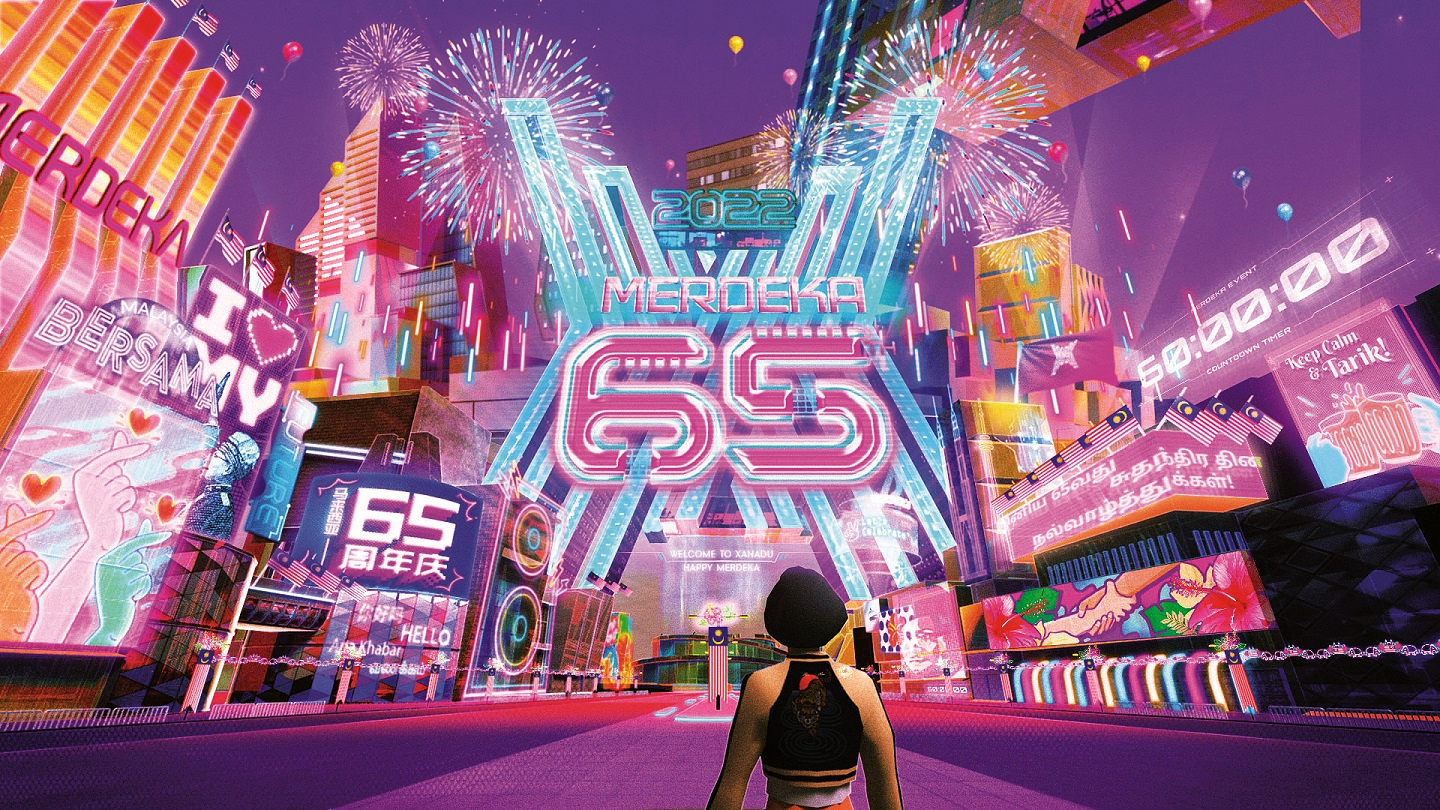
Xanadu, Asia’s entertainment metaverse and NFT gallery that can be experienced during a three-week festival to celebrate 65 years of our country’s independence (Photo: Ministry XR/Xanadu)
Once in a while, a photo lets Ivan Khoo into his grandmother’s mind when wisps of her memory allow it. Like a camera shutter that is constantly misfiring, her brain captures hundreds of impressions and attempts to preserve them before dementia steals them away. As a loved one, unmoored by time, drifts into the abyss, Khoo hopes that the familiar face of a family member can make the fragmented anecdotes in a patient’s life whole again.
Dementia sneaks up like a robber in the night to destroy a house built over a lifetime, but Khoo has realised that technology could be the hand to catch those free-falling in this battle of cognitive decline. When Maxis Bhd approached his company Ministry XR for a Chinese New Year campaign to raise awareness on dementia, Khoo and his team designed a data-driven app called RE:Collection to help patients relive their favourite memories through reminiscence therapy. Working with Kuala Lumpur-based dementia enrichment centre Caring With You and the Alzheimer’s Disease Foundation Malaysia, Ministry XR allows the elderly to recall poignant moments through augmented reality (AR), while giving caregivers better insight into which memory triggers matter the most to their loved ones.
“It was a project that was closest to my heart,” says Khoo, who co-founded Ministry XR with chief technology officer Dr Andrew Yew in 2017, and grew the business into a leading spatial computing solution developer in the region in just four years. But Khoo, a former music and advertising expert, wants to extend his reach beyond the virtualisation of activities and interactions between machines, people and objects. “We’re now looking at advancing humanity by creating a thriving metaverse digital economy. Our virtual lives could play as important a role as our physical realities.”
The biggest ideas in tech often barrel into the lexicon before they are truly coherent but if the jargon above sounds all too intimidating, picture this: You are attending a live performance by your favourite musician, rocking an outfit you have specially put together and cheering away with a group of concertgoers. But here’s the twist — the show is taking place in the metaverse, while your physical self is sitting in your own home. The dress and sneakers you picked out earlier are gaining attention because a non-fungible token (NFT) ensures they are virtual couture. And the cheering? It comes from other avatars who are live-streaming at the same time as you.
20220812_peo_ivon_khoo_ceo_ministry_xr_zhd_0947.jpg
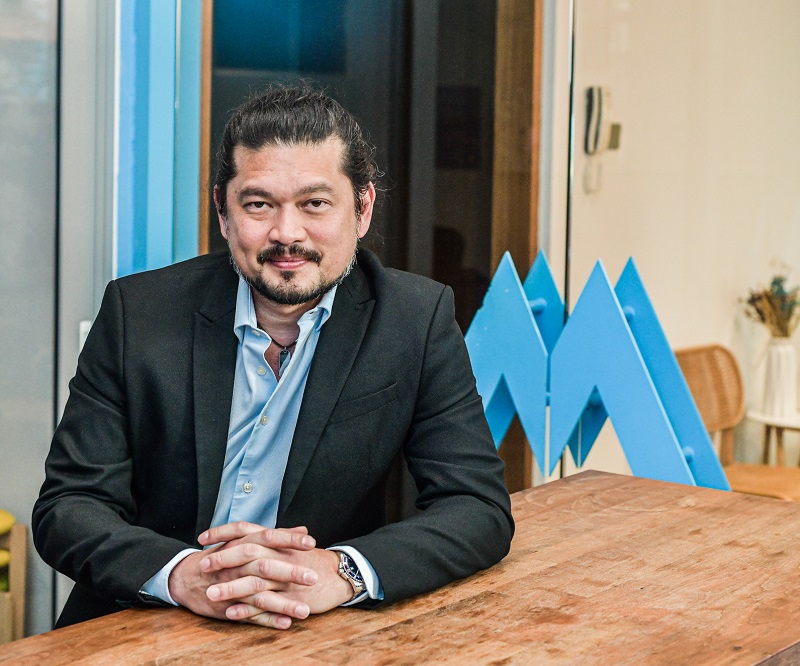
Ever since the concept of metaverse was coined by Neal Stephenson in his 1992 novel Snow Crash to define a 3D world inhabited by digital people, it has been repurposed to describe the convergence of virtual reality and a digital second life in modern times. Although the buzzword has been bandied around in the worlds of commerce, business, finance and entertainment, its definition is still fuzzy and contested as it is continuously shaped by the ambitions of the people using it. Yet, tech titans are wasting no time jumping on the bandwagon — Facebook, for example, renamed itself Meta to reflect its metaverse vision and announced it will make 10,000 hires over the next few years to develop its platform. Touted to supersede the internet, this elevation of the online world will see more game-like representations of people (avatars) interacting in a graphically rich space, where they can work, play, trade, shop and pay for anything with cryptocurrencies. Soon, this will no longer sound like science fiction.
Metaverse, a tangible outcome of a Web 3.0 environment built on blockchain-based protocols that decentralise control and allow users to democratically govern the internet’s direction, radiates the promise of a virtual place untethered by hierarchies and limitations of the real world. Tech players around the globe are already embracing a digital frontier in which social norms and value systems are written anew, but is Malaysia ready for the metaverse? How do we stack up against others in terms of our digital standing?
“I would think that we are 10 years behind,” laments Khoo, who also set up a headquarters in Singapore, which boasts a richer digital ecosystem with stricter digital privacy and security measures.
“We have been going to some of the biggest tech conferences in the world, including the Augmented World Expo in Silicon Valley, the US. When I was there, I felt such a big relief because conversations were easier as everyone shared the same innovative spirit and passion for knowledge. In 2020, 70% of Fortune 500 companies were already making plans to develop digital strategies using XR technology. But progress was a little lagging back home. For instance, when dot-com boomed, how many Malaysians saw the opportunity to make a compelling impact with a solution?”
augmented_reality_expo.jpg
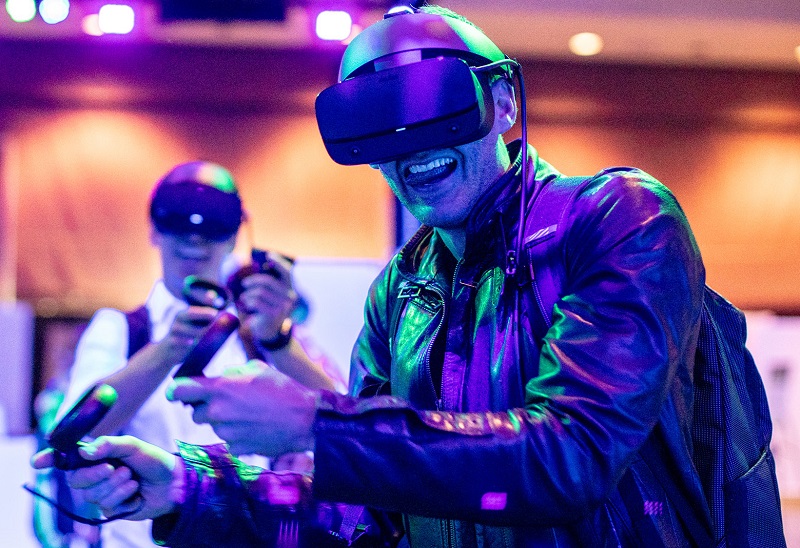
As much as we possess a voracious appetite for technology and a good understanding of AR, Khoo points out that local tech companies are too few and far from being leading-edge to assist with the adoption. Ignorance, fear of change and a high resistance investing in new ideas among business holders despite wanting to leverage AR could also impede Malaysia from being at the forefront of digital fields such as big data, cloud and artificial intelligence (AI).
“The next era of computing [that is ubiquitous computing or the metaverse] will drive the next industrial revolution. And it stems from advancements made on foundational IR 4.0 technologies. We need people of influence to lead, top level corporate management to incite change, and government bodies to provide support by commissioning for proprietary technology development locally and providing subsidies to companies that perform it.”
Thus, to gain a foothold in the virtual world and capitalise on the unlimited realities these technologies offer, Ministry XR is launching Xanadu, Asia’s entertainment metaverse and NFT gallery that can be experienced during a three-week festival to celebrate 65 years of our country’s independence. Billed as the world’s first national day event, the aptly named Merdekaverse allows netizens — particularly the younger generation — to relive the historic declaration of “Merdeka!” by our first prime minister; attend the Tanggal 31 concert by our very own Singing Lawyer; and join a jubilant parade that culminates with firework displays in the sky. To mimic how a real festival would take place, the backdrop of Merdekaverse changes when a user logs in at different times — you may see decorations and flags being put up at Bangunan Sultan Abdul Samad to drum up excitement one day, or jam with a live DJ at Xanadu Beach during the grand finale the next.
tunku_abdul_rahman_and_gang_1_new.jpg
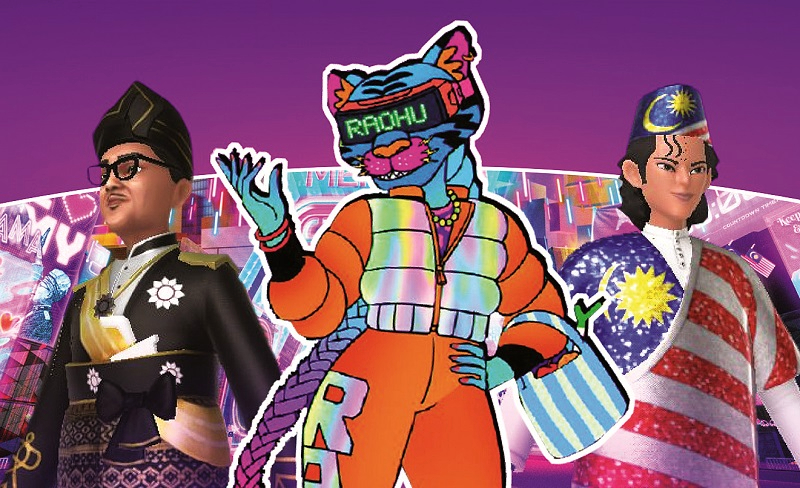
Malaysian-themed games also add to the fun, where players can scour the site for 65 items to win a treasure hunt, navigate pothole-riddled roads in Lari Sampai Pengsan that pokes fun at our daily struggles, or scale our iconic Petronas Twin Towers (or jagungs, as the locals call it) in an obstacle course. As floods are becoming a common sight in the country, a cheeky and satirical side-scrolling game named Banjir Surf raises money to help flood relief organisations while promoting the #kitajagakita mentality.
“This is a way of showing how the metaverse can give back to society and perform transfer of knowledge as we take history lessons out of the classroom,” says Khoo, whose team has worked closely with Arkib Negara and Muzium Negara to glean information, old photos and never-before-seen footage of our Bapa Kemerdekaan to complement the digital festival. Apart from getting government bodies on board, Xanadu has also engaged social enterprise Projek57 and Mercy Malaysia for the event.
“Merdekaverse is a good case study to convince brands about the transformative possibilities of the metaverse. The goal of Xanadu is to redistribute the ownership, power, opportunities and wealth of the internet to its community of creatives, creators and end users. So in the case of Merdekaverse, it’s all wins across the board — music artists get the exposure through an immersive engagement with fans, creators can build more interactive content that courts collaborations, and brands can sponsor local acts and promote partnerships that bring new audiences to the table on their platforms at a small fee. If you look at it, it’s democratising advertising too because as much as people want to be associated with brands, they don’t want commercials to be shoved in their face all the time.”
tar_new.jpg
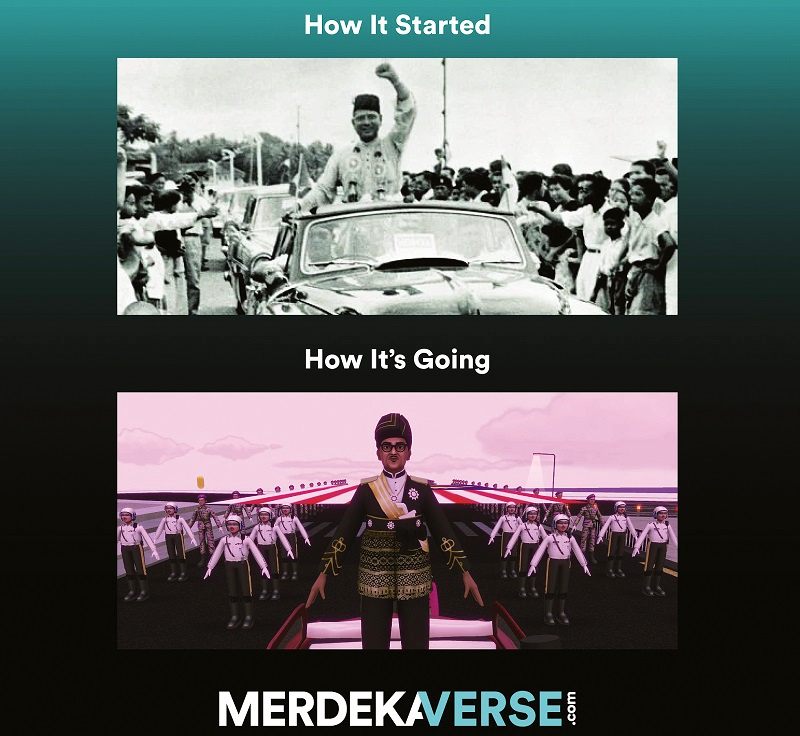
Marketers are slowly seeing the potential for new revenue streams in the metaverse, such as renting digital land they own to other brands or selling digital collectibles to consumers. Although most platforms are still nascent, enthusiasm for the virtual world remains undimmed as a fledgling, savvy generation — which already has one foot in the metaverse via gaming and social media — sees it as an avenue of self-expression. They celebrate individuality over conformity and community over corporations in ways simply not possible in real life. Moreover, thanks to a high rate of internet penetration in Malaysia, forward-thinking schools and teachers are nurturing a crop of tech enthusiasts. Ministry XR’s partnership with Asia Pacific University of Technology & Innovation (APU), which developed state-of-the-art equipment and facilities that include a 360-degree volumetric video capture zone, extended education experience (EDEX) station and mixed reality smart glasses in the form of Microsoft HoloLens, is a salient example.
“We’re trying to create a sustainable ecosystem with a prospective future. If brands, government institutions and large corporations take the leap in spatial technology and, say, the metaverse, more career opportunities will result in a pool of high-value engineers, product visionaries, and creative technologies and UX designers. Having said that, while innovation is crucial, technology adoption should not be driven solely by profit without paying heed to the needs of the community. We can only achieve true digital empowerment if it is done ethically, meaningfully and respectfully,” Khoo asserts.
Digital advances have made it possible to transition to a regulated space without losing the freedom and creative spirit of this incarnation of virtual reality. The cool, distant nature of technology — due to a lack of understanding as it continues to hurtle at accelerating complexity — can, in fact, lean into a warm role as a driver of positive change should we make room for it. If not now, when?
Merdekaverse runs until Sept 16. See here for more info.
This article first appeared on Aug 29, 2022 in The Edge Malaysia.


